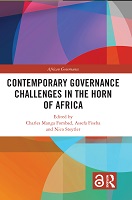Chapter 4 Federalism, devolution, and territorially-based cleavages in Africa
Proposal review
Does institutional design matter?
Abstract
Whether it is possible to ensure stability, peace and social cohesion in countries with deep societal divisions where identity prevails over other bases of mobilisation is one of the central political questions of our time. What type of institutional design suits deeply mobilised cleavages? This chapter discusses the different institutional approaches adopted in three federations of Africa to manage politically mobilised cleavages, and examines whether institutional design matters in addressing demands from politically mobilised groups. The main issue is whether such divisions should be treated as building-blocks for political engagement and institutions built around them, or rather be diffused and deliberately divided into several sub-units. It is argued that institutional design does matter, particularly when there are deep territorially-based divisions, and proposes consociational parliamentary federations as opposed to integrationist presidential federations. The latter aim to divide major ethnic groups into many small-size states denying their self-government right, while the former aim to empower groups by redrawing territories to ensure they become a majority at sub-state level. They also bring the major political actors into power and minimise the risks of ‘winner-takes-all’ politics associated with presidential systems.
Keywords
Federalism, Devolution, Territorially-Based Cleavages, AfricaDOI
10.4324/9781003265306-4ISBN
9781032207926, 9781032207995, 9781003265306Publisher
Taylor & FrancisPublisher website
https://taylorandfrancis.com/Publication date and place
2023Grantor
Imprint
RoutledgeClassification
Government powers
Peace studies and conflict resolution
Politics and government


 Download
Download